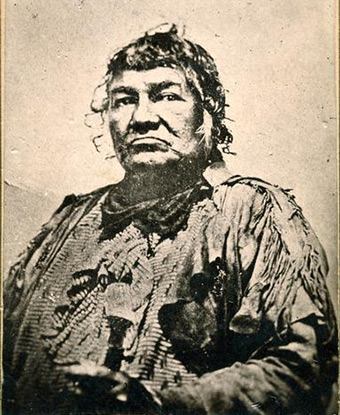Last updated: February 22, 2019
Person
Shab-eh-nay (He Who Paws Through)

Wisconsin Historical Society
The famed Shawnee leader Tecumseh counted Shab-eh-nay as one of his good friends and staunchest allies during the War of 1812. Both fought the Americans together on multiple occasions, including at Detroit in 1812 and 1813. Shab-eh-nay also accompanied Tecumseh on trips across the eastern United States, in hopes of recruiting other tribes to fight against the Americans.
Like Tecumseh, Shab-eh-nay was against the killing of civilians and prisoners of war. After the 1812 attack on Fort Dearborn, a small number of Americans managed to escape to the house of a local trader. Shab-eh-nay, along with Black Partridge and a host of other warriors, agreed the prisoners were to be delivered to Detroit, despite vengeful warriors who wanted kill them. He and the others persuaded the angry warriors to halt their hostile actions towards the American women and children.
For Shab-en-nay, valor would not be reserved for the battlefield. After the War of 1812, Shab-eh-nay chose a path of peace instead of war, a decision that was tested by the Sauk war chief Black Hawk. In 1832, Black Hawk led Sauk and Meskquakie warriors against American settlements infringing on their lands. Upon hearing news of approaching Sauk war parties, Shab-eh-nay and his family rode to different American homes in what is now Kalb County, Illinois, warning them of the impending danger and encouraging them to leave in order to save their lives. The families who heeded Shab-eh-nay’s warnings lived; those that did not died at the hands of Sauk warriors. Shab-eh-nay would later loose his son and nephew to vengeful Sauk warriors. He would also lose his village lands that were promised under the Prairie du Chien treaty of 1829, to the American population he strove to protect.
